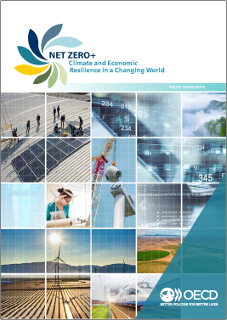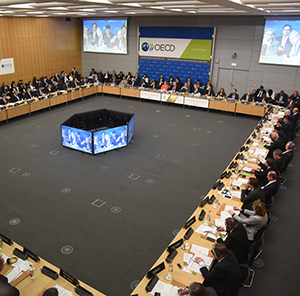The OECD’s Horizontal Project on Climate and Economic Resilience is using the multidisciplinary reach of the OECD to support governments in driving the swift transformational change needed to tackle climate change.
The project provides analysis and insights for governments looking at the whole climate picture: driving a rapid and resilient transition to net-zero while building resilience to physical climate impacts, all in the context of lingering effects of COVID-19 and the far-reaching effects of Russia’s unprovoked war of aggression in Ukraine.
16 May 2023
The event consisted of a keynote address by OECD Secretary-General Mathias Cormann, an overview presentation of the report by OECD Environment Director Jo Tyndall, followed by a high-level panel discussion on the themes of the report. Panellists included Natacha Alexander, Ambassador of the United Kingdom to the OECD; Dominic Waughray, Executive Vice President, World Business Council for Sustainable Development (WBCSD); Sébastien Treyer, Executive Director, Institut du Développement Durable et des Relations Internationales (IDDRI); and Andy Kerr, CSO, Climate-KIC.
The key findings of the report have been distilled into a short summary, which highlights key messages and summarizes relevant findings from each of the reports three substantive parts. This overview draws on the full breadth of the OECD’s multidisciplinary expertise, and synthesises policy recommendations for accelerating resilient action on climate change, including 12 steps that governments can take to build climate and economic resilience.

This blog post introduces 12 steps governments can take for building climate and economic resilience. The steps are the result of the first phase of the flagship cross-OECD initiative “Net Zero+: Climate and Economic Resilience in a Changing World”.
Improving economic resilience has become a key priority for governments as they have grappled with recent turbulent events. At the same time, the climate crisis is becoming ever more urgent. Unchecked, climate change will pose a significant and escalating threat to global economic and social stability, in particular if irreversible “tipping points” are triggered.
This OECD Horizontal Project is supporting governments in taking rapid and resilient action on climate change as part of strategies to improve economic resilience and security. Key themes include:
OECD country governments are guiding the project via a leadership group comprised of senior officials from across the OECD’s wide range of policy committees.
Combined with the multidisciplinary policy expertise housed across the organisation, this maximises the unique value of OECD’s all-of-government reach.
The project also benefits from a dedicated high-level External Advisory panel made up of high-profile international leaders.

For more information, please feel free to contact Mr. Ben Henderson, Senior Project Manager, OECD Environment Directorate.